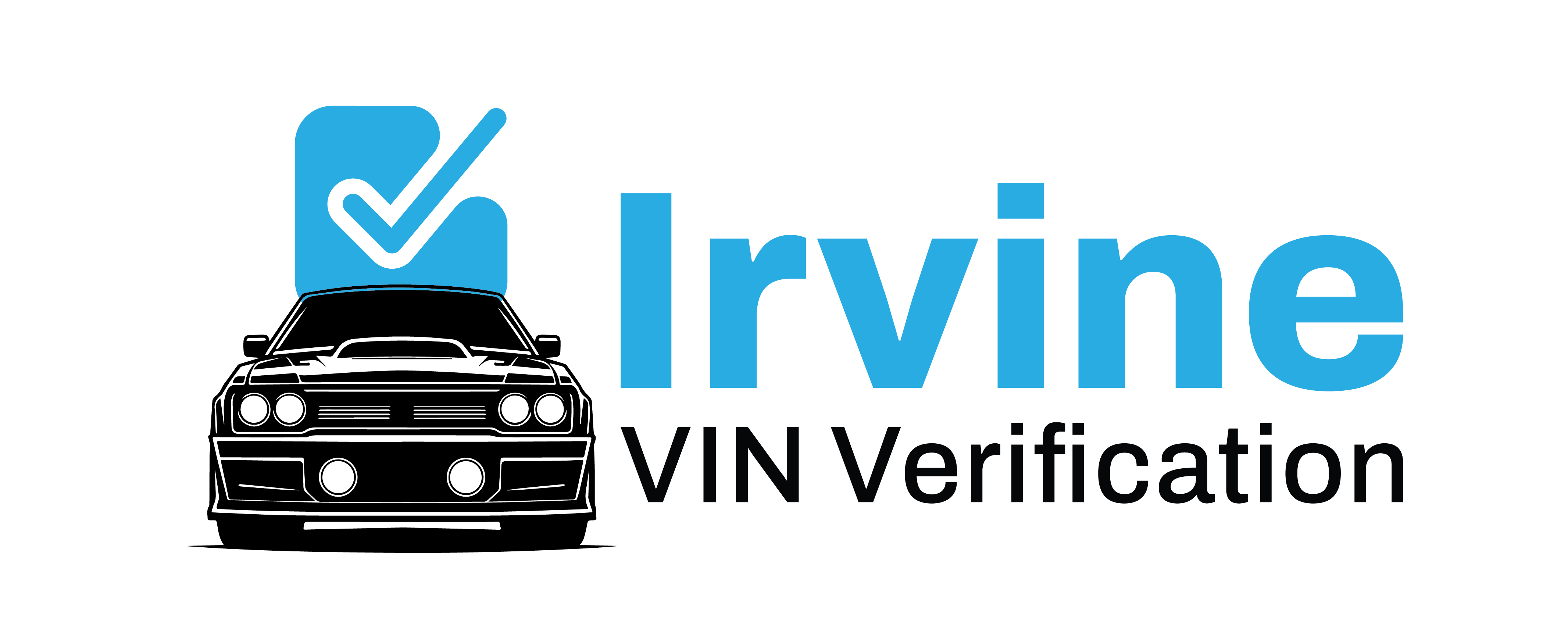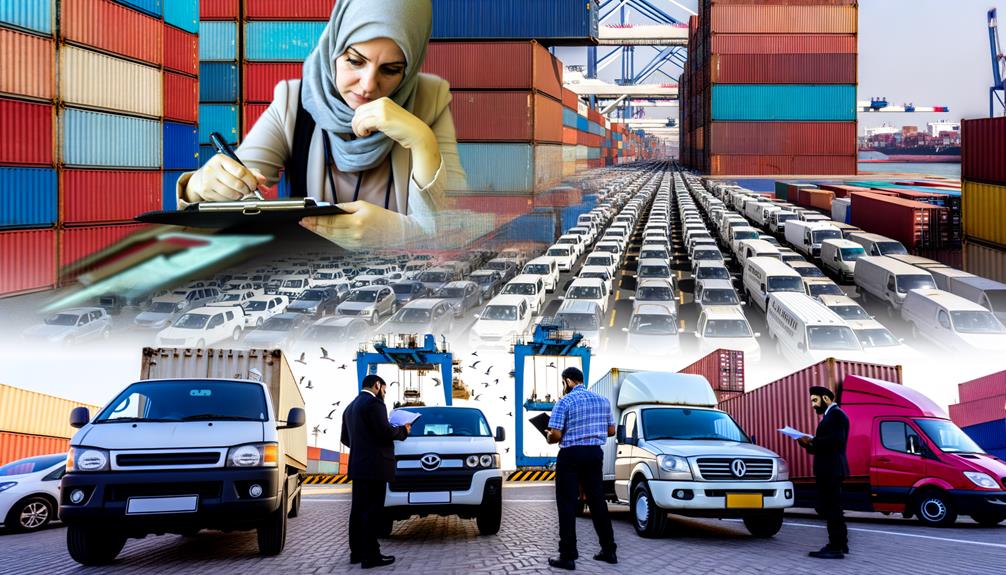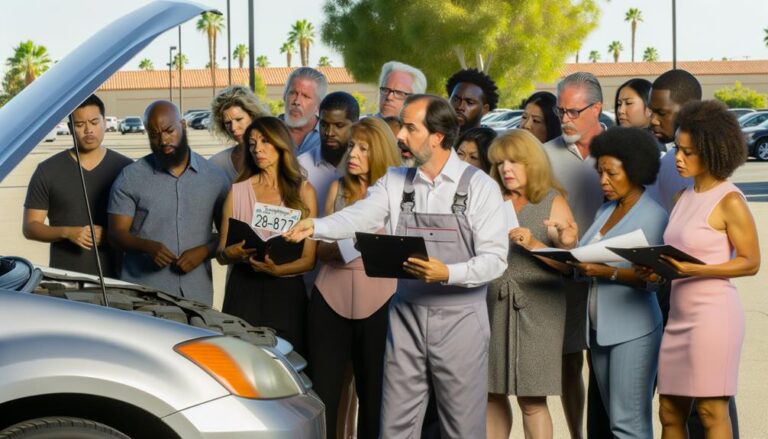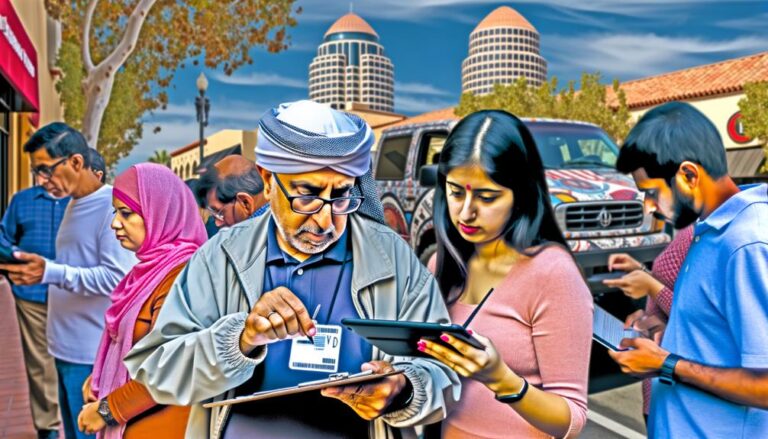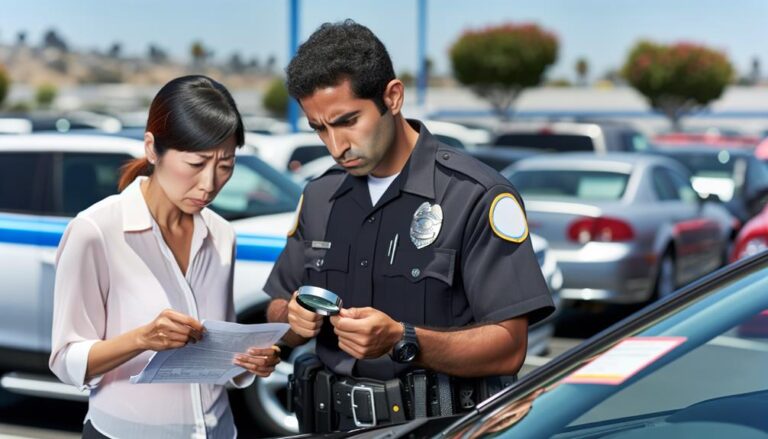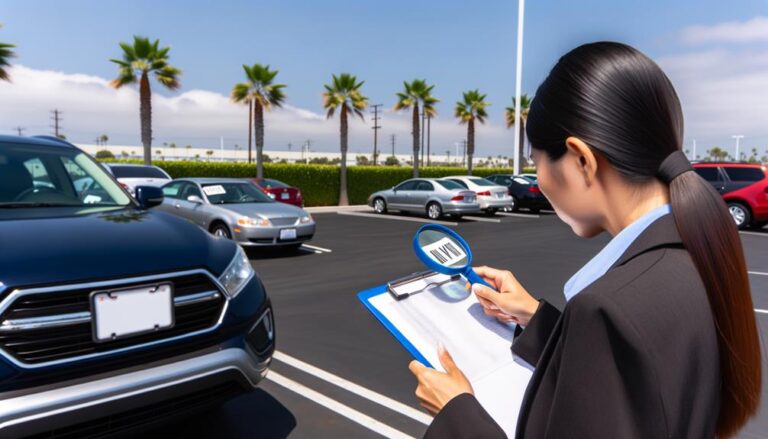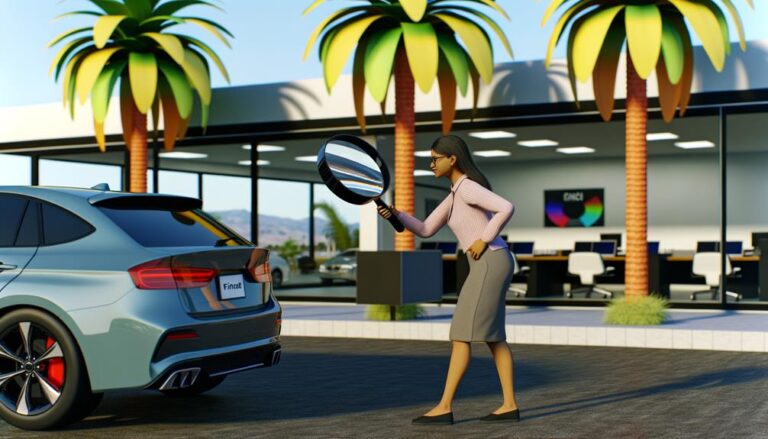When you're exporting a vehicle from Irvine, VIN verification is a must to guarantee that your vehicle's identification number matches its documentation. This process helps prevent registration hitches and shields you against fraud by confirming the vehicle's legitimacy. Adhering to California DMV regulations and international standards, VIN verification is essential for maintaining legal compliance throughout the export process. It not only verifies the accuracy of your vehicle's details but also protects you from potential legal issues concerning vehicle ownership. Exploring this further may present you with deeper insights into guaranteeing a smooth vehicle export experience.
Overview of California VIN Verification
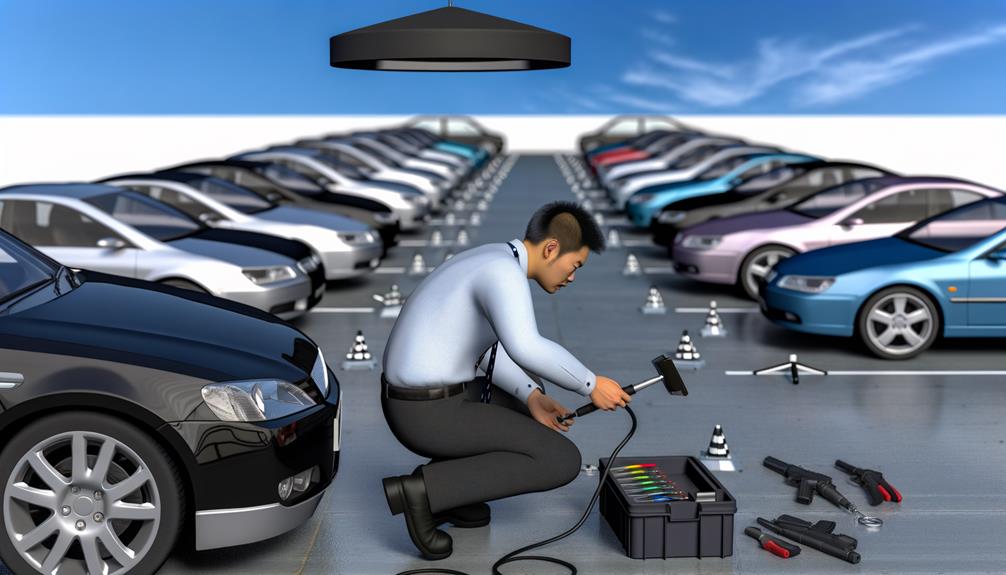
California requires a VIN verification for all vehicles being registered, especially those imported from other states or being exported. This process, vital for maintaining your freedom to operate your vehicle legally without hassle, is managed through the California DMV.
When you're gearing up to send your car abroad, you need this verification to guarantee that your vehicle's identification number matches its title and other official documents.
VIN verification isn't just a bureaucratic step; it's a shield against vehicle fraud. By verifying details like the VIN location and the presence of federal certification labels, licensed vehicle verifiers ascertain that every vehicle meets strict standards.
This protects you from potential legal issues and helps maintain the integrity of vehicle transactions. For vehicles coming from out-of-state or changing configurations, this verification is essential to meet California's specific registration requirements.
The process is documented on the REG31 form, a vital document for both vehicle registration and export compliance.
Whether you're dealing with a sleek sports car or a sturdy SUV, this form records the necessary details that align with state and federal requirements.
Inspection Criteria and Limitations
Guaranteeing your vehicle meets the necessary criteria for VIN verification is vital when preparing it for export. During the inspection, the verifier will meticulously check your vehicle's year, make, model, and the specific location of the VIN. This step guarantees the accuracy of your documentation, fundamental for a smooth export process.
Additionally, they'll document the number of wheels and axles and verify the fuel type and odometer reading, which are all essential for complying with export regulations. It's important to emphasize that authorized personnel such as DMV employees or licensed private VIN verifiers are required to perform these inspections, guaranteeing that all details are correctly documented on the REG 31 form.
However, you'll face certain limitations. For instance, revived salvage vehicles and junked vehicles are ineligible for VIN verification, thereby blocking their path for legal export. Similarly, vehicles manufactured in 1980 or later without a federal safety label can't undergo verification, affecting their exportability. This is critical as the label confirms compliance with safety standards.
Moreover, motorcycles pose their unique set of challenges. Without supporting documentation or prior DMV records, these vehicles are excluded from the inspection process. This restriction can considerably hinder your freedom to export motorcycles from Irvine.
Understanding these inspection criteria and limitations helps streamline your vehicle export process, guaranteeing you meet all necessary regulations without unexpected hurdles.
Options and Costs for Verification
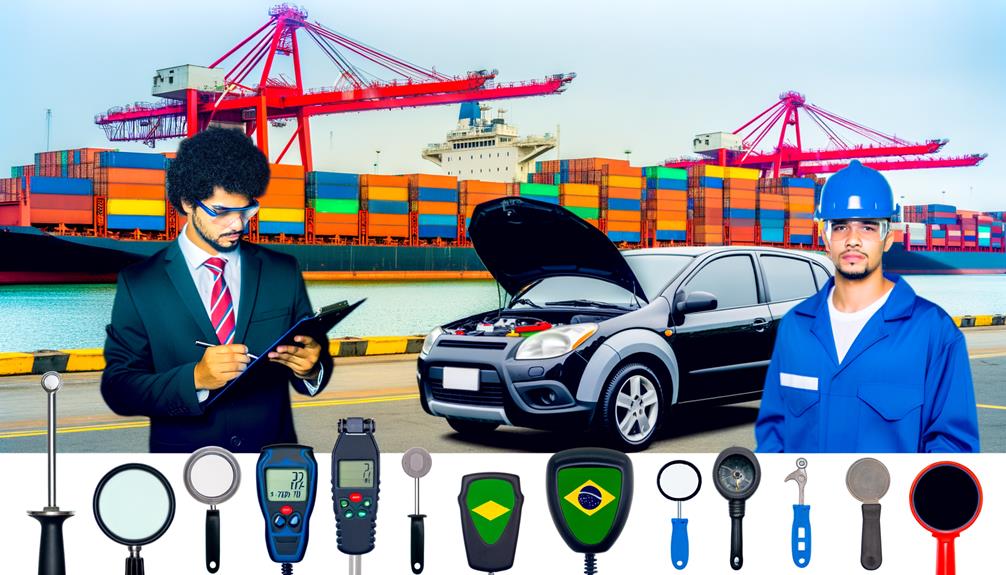
After understanding the necessary inspection criteria and facing the limitations for VIN verification, you might now be wondering about the different options available and their associated costs. For vehicle export from Irvine, you've got several choices that balance cost against convenience.
First off, the California DMV and the California Highway Patrol (CHP) offer no-cost VIN verification. However, both require specific prior arrangements—DMV needs your complete paperwork, and CHP asks for a referral from the DMV. Neither provides mobile services, so you'll need to visit their offices.
If you're an AAA member, you're in luck; VIN verification is free for certain vehicle types. Remember, this doesn't cover mobile services, so you'll have to bring your vehicle to their location.
For more flexible options, Quick VIN Verification in Irvine could be your go-to. They charge $45 for standard in-person verification. If you can't make it to their site, mobile services are available, ranging from $67 to $147, depending on your location.
They accept a variety of payment options—cash, checks, Zelle, Venmo, and credit or debit cards—making the process as smooth as possible for you. Additionally, if you need to register a commercial vehicle or seek emissions compliance, various solutions tailored to your needs are available through DMV Solutions.
Scheduling VIN Inspection Appointments
You can easily schedule your VIN inspection appointment by calling 714-627-9211 or by visiting the designated online portal. This flexibility allows you to manage your schedule and guarantees that you're not tied down by inconvenient appointment times.
Whether you're looking to export your vehicle or simply confirm its compliance, scheduling a VIN inspection is a critical step.
If you prefer, you can also send an email inquiry to set up your appointment, adding an extra layer of convenience. Quick response times from the scheduling team mean you won't be left waiting; you'll get your confirmation swiftly and can proceed with your plans without delay.
The system is designed to cater to your needs, offering appointments at various verified locations such as the DMV, CHP, or other licensed vehicle verifiers.
This choice empowers you to select a location that best fits your preferences, whether it's proximity, familiarity, or speed of service.
Remember, securing an appointment for a VIN verification is essential for the export process, confirming your vehicle meets all necessary legal standards.
Don't hesitate to take control of your vehicle's verification process through effective scheduling.
Payment Options and Assistance

When you're ready to pay for your VIN verification service, you have several options to choose from. Quick Auto Tags makes it simple and straightforward, offering you the freedom to use cash, checks, or digital platforms like Zelle and Venmo. This flexibility guarantees you can handle the transaction in a way that suits your lifestyle.
Credit and debit cards are also accepted, catering to your preference for quick electronic transactions. Whether you opt for in-person inspections or the convenience of mobile services, you're covered.
The cost of in-person inspections is around $35, while mobile services vary, ranging from $67 to $147, depending on your location.
If you need help beyond just payment, assistance is just a phone call away. Contacting Quick Auto Tags at 951-409-9091 can guide you through any additional vehicle transaction queries you might have.
Scheduling appointments for VIN verification is hassle-free, either by phone or online, providing you with multiple ways to secure a spot that fits into your schedule.
Understanding VIN Verification Importance
Understanding the importance of VIN verification for vehicle export from Irvine is essential because it guarantees that the vehicle's identification number matches its documentation. This step isn't just about ticking a box; it's about ensuring you're fully in control, free from future hassles with registration issues or legality pitfalls in the export process.
VIN verification serves as your shield against fraud, confirming the legitimacy of the vehicle you're setting free across borders. Imagine exporting a vehicle only to find out it's entangled in legal complications—verification sidesteps such nightmares. It's your first line of defense, ensuring that every detail on paper matches the powerful machine you've invested in.
Moreover, adhering to California DMV regulations and international standards through proper documentation compliance isn't just bureaucracy; it's your passport to seamless transactions and uninterrupted travel of your vehicle to its new destination.
Vehicles meeting emissions standards is another non-negotiable—skip this, and you're looking at penalties, not freedom, in the receiving country.
Limitations and Challenges of Verification
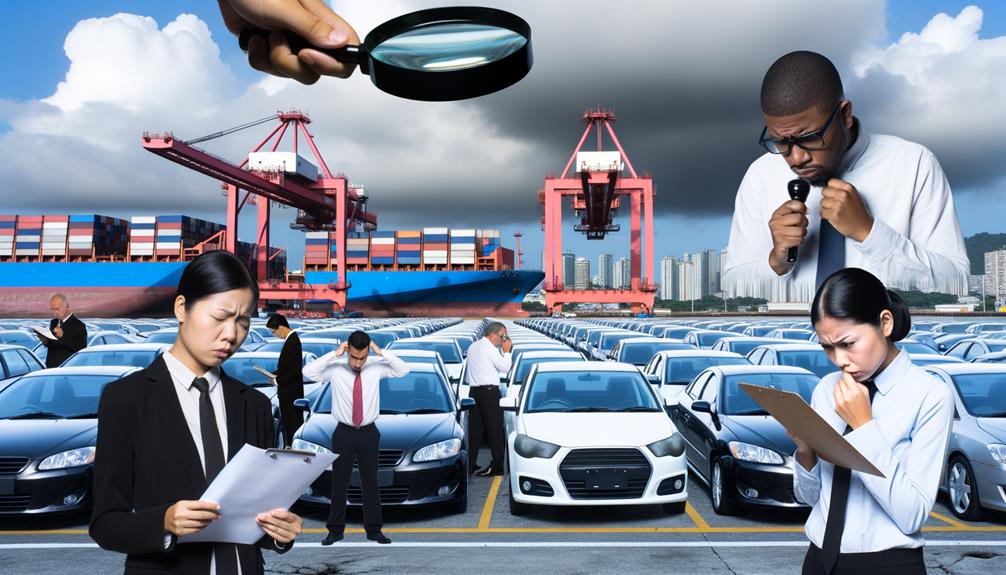
While VIN verification provides a robust defense against fraud and legal complications during vehicle export, it's not without its limitations and challenges. If you're looking to export a revived salvage vehicle from Irvine, you'll hit a roadblock as these vehicles are excluded from VIN verification. This restriction can be frustrating, especially when you're aiming to navigate the export process smoothly and freely.
Additionally, exporting motorcycles can become a hassle if the bike lacks supporting documentation or previous DMV records. This gap in verification eligibility limits your options considerably.
For those of you dealing with direct import vehicles, the challenges only multiply since these vehicles are also not eligible for VIN verification due to their non-U.S. origin. This can feel like a considerable setback if you value the freedom to trade internationally.
Moreover, any vehicle manufactured after 1980 must have a Federal Safety label to undergo VIN verification. Missing this label, along with EPA and NHTSA compliance stickers, can stall or completely halt the verification process.
These registration challenges and verification limitations surely complicate your aspirations for a straightforward vehicle export, impacting your freedom to move goods across borders efficiently.
Financial Considerations and Smog Testing
Maneuvering the financial landscape of vehicle importation involves understanding the considerable costs associated with compliance measures and inspections. When you're exporting a vehicle, you're not just paying for the vehicle itself; there's a whole slew of import costs and requirements you need to meet, especially in California.
First off, smog testing is a big deal here. If your vehicle was made after 1976, you'll need to make sure it passes these tests to meet California regulations. This isn't just about keeping the air clean; it's about compliance that keeps you free from hefty fines and registration delays.
Keep in mind, new vehicles dodge this requirement for the first eight years unless modifications are made, which would then require a smog check.
Moreover, don't overlook the vital step of VIN verification. This isn't just bureaucratic red tape. Confirming your vehicle's VIN is verified early can save you a ton of trouble down the line.
It's essential for aligning with compliance standards and avoiding the headaches of unverified vehicles that can stall your vehicle registration process. Remember, each unanticipated delay can mean more dollars out of your pocket.
Plan wisely to maintain your freedom on the roads.
Frequently Asked Questions
Why Do I Need a VIN Verification in California?
You need a VIN verification in California to guarantee your vehicle's identity matches DMV records, preventing legal hassles and guaranteeing smooth ownership transfers or exports. It's essential for avoiding registration delays and potential fraud.
Why Do I Need a VIN Verification in Ct?
You need VIN verification in CT to guarantee your vehicle's details match its documentation, preventing legal issues and fraud. It's essential for registering out-of-state vehicles and safeguarding your investment from potential hidden problems.
How Much Does a VIN Verification Cost in California?
In California, VIN verification costs vary. At physical locations, it's $35, but mobile services range between $67 and $147. You can also get it free at the DMV or CHP with prior paperwork.
Does AAA Do VIN Verification in California?
Yes, AAA does perform VIN verification in California for its members. It's free but limited to certain vehicle types, and you'll need to bring your vehicle to a physical location with all required documents.
